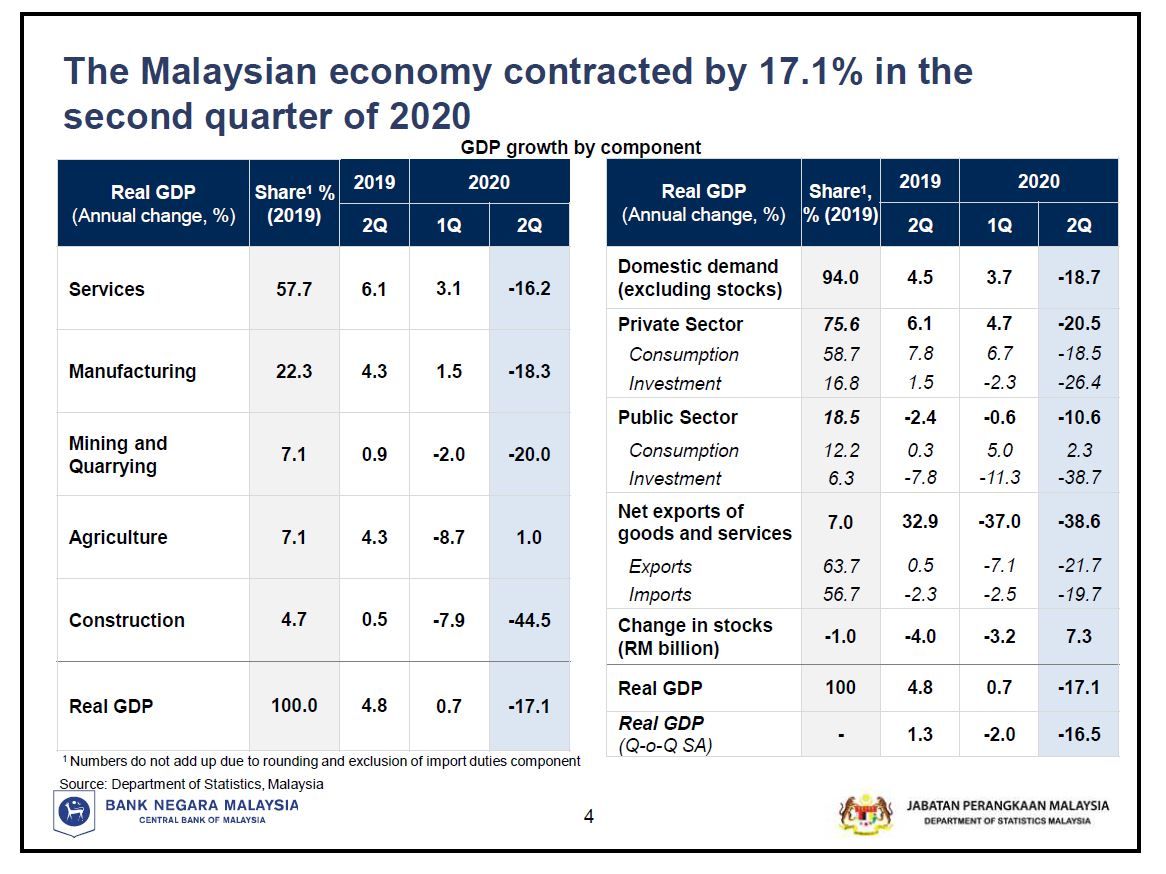Malaysia: Economy shrinks 17.1% in 2Q, weakest since 1998
KUALA LUMPUR: Malaysia’s economy shrank 17.1% in the second quarter ended June 30 as it was seriously impacted by the movement control orders, especially in April, which was a much deeper contraction compared with a Bloomberg survey of 10.9%.
In a statement issued on Friday, the Statistics Department said the 2Q performance was the lowest recorded since the fourth quarter of 1998 (-11.2%) during the height of the Asian Financial Crisis.
In 1Q, GDP grew a marginal 0.7% as the Movement Control Order (MCO) was enforced on March 18.
Chief Statistician of Malaysia Datuk Seri Dr Mohd Uzir Mahidin said 2Q was a challenging period for the economy due to the MCO and weakened external sector as countries implemented lockdowns to prevent the spread of the pandemic.
“The government’s main priority was to ensure the health and safety of the Malaysians. The implementation of the MCO, Conditional MCO and Recovery MCO in containing the widespread of Covid-19 pandemic have affected the overall Malaysia’s economic activities, ” he said.
“As an open economy, Malaysia’s degree of openness is 123% (2019) which is among the highest in the world. This is explained by the percentage of total trade for goods and services towards GDP, ” he said.
The 2Q GDP was also affected from the weakened external sector due to the spread of Covid-19 in 210 countries.
“Thus, the lethargic demand has affected the production of manufacturing for export-oriented based industries which declined by 13.5% that shaped 71% of the manufacturing sector’s value added. Total trade for this quarter declined by 14.7% as compared to 2Q of 2019, ” he said.
Mohd Uzir said in 2Q on the production side, all sectors recorded a negative growth with the exception for agriculture sector.
Services and manufacturing sectors recorded a negative 16.2% and 18.3% respectively. However, the construction sector plummeted 44.5% while mining & quarrying declined by 20%.
On the demand side, all final demand components declined except for government final consumption expenditure which recorded a positive growth of 2.3%.
Private final consumption expenditure decreased by 18.5%, gross fixed capital formation contracted by 28.9%. As for exports, they recorded a 21.7% decline while imports fell by 19.7%.
Mohd Uzir said the compilation of the 2Q GDP was further improvised with the additional estimation of monthly GDP in measuring the current economic performance.
“Based on monthly GDP estimates, the sharp decline in the economy was observed in April 2020 whereby GDP contracted 28.6%.
“The performance in May improved to negative 19.5% and continued to further improve in June by registering a small contraction of negative 3.2%, ” he said.
The slower contraction in June was observed in all sectors especially in the manufacturing and agriculture sectors which posted a positive growth of 4.5% and 11% respectively.
Other sectors posted a slower contraction with construction: -12.7%, mining & quarrying: -16.4% and services: -6.0%).
Mohd Uzir said in June 2020, Malaysia’s exports performance signalled a recovery from the impact of the pandemic by registering a positive growth of 8.8% to RM82.9bil resulting in a trade surplus of RM20.9bil, the largest value ever recorded.
This was a turnaround from May when Malaysia’s trade contracted by 27.8% year-on-year.
In 2Q, he said about 735 industries recorded a negative growth (1Q 2020: 381 industries) with a value added share of 68.5% (RM176.1bil). Value added of 735 industries fell 27.4% as compared to 2Q a year ago.
He added only 260 industries recorded positive growth (1Q: 2020: 617 industries) with a value added share of 31.4% (RM110.2bil).
The gloomy growth of Malaysia’s trade can be observed from the total transactions where 7.9 million transactions was recorded in 2Q 2020 as compared to 11.4 million transactions a year ago.
However, there are green shoots of recovery as Mohd Uzir said the Leading Index showed an improved signal in May which is in line with the reopening of business activities under the CMCO starting from May 4 after economic activities “froze” in the previous month.
The implementation of the stimulus packages Pakej Rangsangan Ekonomi Prihatin Rakyat (PRIHATIN), Pelan Jana Semula Ekonomi Negara (PENJANA) and the short-term economic recovery plan to cushion the Covid-19 impact are expected to alleviate further the economic downturn with a recovery seen in 3Q, he said.
Source: https://www.thestar.com.my/business/business-news/2020/08/14/economy-shrunk-171-in-2q-weakest-since-1998


 Thailand
Thailand





